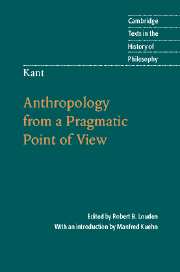Book contents
- Frontmatter
- Contents
- Introduction
- Chronology
- Further reading
- Note on the text and translation
- Anthropology from a Pragmatic Point of View
- Preface
- Contents
- Part I Anthropological Didactic. On the way of cognizing the interior as well as the exterior of the human being
- Part II Anthropological Characteristic. On the way of cognizing the interior of the human being from the exterior
- A The character of the person
- B The character of the sexes
- C The character of the peoples
- D The character of the races
- E The character of the species
- Index
- Cambridge Texts in the History of Philosophy
C - The character of the peoples
Published online by Cambridge University Press: 05 June 2012
- Frontmatter
- Contents
- Introduction
- Chronology
- Further reading
- Note on the text and translation
- Anthropology from a Pragmatic Point of View
- Preface
- Contents
- Part I Anthropological Didactic. On the way of cognizing the interior as well as the exterior of the human being
- Part II Anthropological Characteristic. On the way of cognizing the interior of the human being from the exterior
- A The character of the person
- B The character of the sexes
- C The character of the peoples
- D The character of the races
- E The character of the species
- Index
- Cambridge Texts in the History of Philosophy
Summary
By the word people (populus) is meant a multitude of human beings united in a region, in so far as they constitute a whole. This multitude, or even the part of it that recognizes itself as united into a civil whole through common ancestry, is called a nation (gens). The part that exempts itself from these laws (the unruly crowd within this people) is called a rabble (vulgus), whose illegal association is the mob (agere per turbas), – conduct that excludes them from the quality of a citizen.
Hume thinks that if each individual in a nation is intent on assuming his own particular character (as with the English), the nation itself has no character. It seems to me that he is mistaken; for affectation of a character is precisely the general character of the people to which he himself belongs, and it is contempt for all foreigners, particularly because the English believe that they alone can boast of a respectable constitution that combines civil freedom internally with power against outsiders. – A character like this is arrogant rudeness, in contrast to the politeness that easily becomes familiar; it is obstinate behavior toward every other person from supposed self-sufficiency, where one believes that one has no need of anybody else and so can be excused from kindness toward other people.
Thus the two most civilized peoples on earth, England and France, have contrasting characters, and perhaps chiefly because of this are in a constant feud with each other.
- Type
- Chapter
- Information
- Kant: Anthropology from a Pragmatic Point of View , pp. 213 - 222Publisher: Cambridge University PressPrint publication year: 2006



